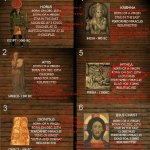I provided an endorsement for Jonathan Bernier’s new book Rethinking the Dates of the New Testament. Here’s what I wrote, which you can find quoted on the publisher’s website:
In Rethinking the Dates of the New Testament Jonathan Bernier offers a much-needed corrective to the tendency for the dates assigned to New Testament works to drift further and further in opposite directions due more to ideological preferences than evidence, or to be confidently placed roughly around the middle of a possible range as though that were consistently the best way to respond to our historical uncertainty. With careful attention to the evidence for each individual work as well as the relationships among them, Bernier makes a strong case for earlier dates for many of these texts than has become the scholarly consensus. In Rethinking Bernier takes seriously our inability to be absolutely certain and precise about dates, never shying away from providing a date range that starts astonishingly early and/or continues until well into the second century when the evidence supports this. At the same time he never allows the range of possibilities to serve as an excuse for not deducing and arguing for what is likely. Whether by gaining wide acceptance or by prompting well-argued responses (and most likely both) Bernier’s book promises to shake up the scholarly study of New Testament and some of the earliest extracanonical Christian works. Whether the long-term result is a shift in consensus or persuasive responses to his arguments, what Bernier has provided will undoubtedly serve as an impetus to refreshing scholarly conversations for decades to come.
Bernier makes chronology interesting and expresses himself in a style that is truly enjoyable to read. If you’re afraid this is going to be a dull sifting through dates with tedious calculations and correlations, let me reassure you that is far from being the case. Some of my favorite lines in the book include:
- If chronology is the proverbial backbone of history, then the study of Christian origins has developed a scoliosis.
- This dearth of adequate-length monographs should not be taken as evidence that the dates of the New Testament are so solidly established as to be immune to significant revision, but rather as reason to suspect that the dates so frequently affirmed have not been quite so solidly established as we might want to think.
- Harnack’s argument is not from silence. Rather, it is an argument from presence, indeed, the presence of extended (eight chapters!) discussion of Paul’s legal challenges and an ending that leaves said challenges unresolved…On such explanations, Luke wants to elide the very thing to which the last quarter of Acts draws attention.
- It is difficult to imagine that an author writing after 70 would employ the fall of Jerusalem for symbolic effect and yet grossly misrepresent the nature of that fall and, more to the point, underestimate its extent. As such, unless we can demonstrate the presence elsewhere in Revelation of material that likely derives from a post-70 context, the balance of probabilities should incline us toward a pre-70 date for the book.
- No less than any other piece of writing might be, eyewitness reports are subject to the vicissitudes of memory, the demands of polemic, and the crafting of narrative.
- [W]ith the publication of this work, two complete, monograph-length studies have been published since the turn of the twentieth century by professional biblical scholars who defend lower chronologies for the composition dates of the New Testament corpus, while there have been zero similar studies defending middle or higher chronologies. This puts lower chronologies in an intellectually privileged position.
I’m eager for the discussion that will hopefully result from Bernier’s book being published. I’m hoping at some point in the coming years to turn my attention to John A. T. Robinson’s other major work that hasn’t received the attention or made the impact it deserved to, namely his The Priority of John. (Bernier is revisiting the case Robinson set forth in his Redating the New Testament) I think there is much more room for recognizing the Gospel of John as stemming from an eyewitness and reflecting history than tends to be granted. Despite what Richard Bauckham and others have tended to argue, it is possible to embrace that an eyewitness could take their own thinking about Jesus in a direction that was distinctive and involved significant development beyond what anyone (including that eyewitness) had perceived at the time Jesus was alive and walking the earth. More needs to be said, however, about the process that could have led them there than Robinson managed to put in print before he died.
I’ll get to that, I hope, eventually. In the meantime, read Bernier’s book and think and talk about it!














